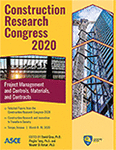Construction Research Congress 2020
Studying Physical and Cognitive Status of Construction Workers
Publication: Construction Research Congress 2020: Project Management and Controls, Materials, and Contracts
ABSTRACT
This research documents an initial interdisciplinary effort to record and fuse the physiological and cognitive status of construction workers. Limited data exist informing how and to what extent construction work and activities impact both physical and cognitive ability. For this research under the management of eight researchers, nine cadets enrolled in the 2019 summer program at the field engineering and readiness laboratory (FERL) at the United States Air Force Academy volunteered to collect synchronous physiological, cognitive, and photographic data over a three-week period while they performed construction related activities. This paper documents research tasks, challenges related to data collection and analysis, as well as lessons learned. The contribution is to assist and inform future researchers interested in collecting and synthesizing physical and cognitive data related to construction activities.
Get full access to this article
View all available purchase options and get full access to this chapter.
References
Abdelhamid, T. S., & Everett, J. G. (2002). Physiological Demands during Construction Work. Journal of Construction Engineering and Management, 128(5), 427–437. https://doi.org/10.1061/(ASCE)0733-9364(2002):5(427)
Awolusi, I., Marks, E., and Hallowell, M. (2018). “Wearable technology for personalized construction safety monitoring and trending: Review of applicable devices.” Automation in Construction, Elsevier, 85(July 2016), 96–106.
Anderson, Peter. 2002. “Assessment and Development of Executive Function (EF) During Childhood.” Child Neuropsychology : A Journal on Normal and Abnormal Development in Childhood and Adolescence8: 71–82. https://doi.org/10.1076/chin.8.2.71.8724
Basner, M., & Dinges, D. F. (2011). Maximizing sensitivity of the psychomotor vigilance test (PVT) to sleep loss. Sleep, 34(5), 581-591.
Basner, M., Mollicone, D., & Dinges, D. F. (2011). Validity and sensitivity of a brief psychomotor vigilance test (PVT-B) to total and partial sleep deprivation. Acta astronautica, 69(11-12), 949-959.
Brisswalter, J., Collardeau, M., & René, A. (2002). Effects of acute physical exercise characteristics on cognitive performance. Sports medicine, 32(9), 555-566.
Cahn-Weiner, Deborah, Patricia Boyle, and Paul Malloy. 2002. “Tests of Executive Function Predict Instrumental Activities of Daily Living in Community-Dwelling Older Individuals.”
Cheng, T., and Teizer, J. (2013). “Real-time resource location data collection and visualization technology for construction safety and activity monitoring applications.” Automation in Construction, Elsevier B.V., 34, 3–15.
Clevenger, C., Pillsbury, W., Young, R., Abdallah, M., Brothers, H. (2018a) Pilot Implementation of Assessing Physiological Measures during Construction Activities using Air Force Cadets, Proceedings of the 2018 Construction Research Congress, April 2-5, 2018, New Orleans, Louisiana, pp. 512-521.
Dinges, D. F., & Powell, J. W. (1985). Microcomputer analyses of performance on a portable, simple visual RT task during sustained operations. behavior research methods, instruments, & computers, 17(6), 652-655.
Fery, Y -A., Ferry, A., Hofe, A. V., & Rieu, M. (1997). Effect of Physical Exhaustion on Cognitive Functioning. Perceptural and Motor Skills, 84(1), 291-298.
Fisk, JE, Sharp, CA (2004). Age-related impairment in executive functioning: updating, inhibition, shifting, and access. Journal of Clinical and Experimental Neuropsychology. 2004:26(7), 874-890.
Foster, J. L., Shipstead, Z., Harrison, T. L., Hicks, K. L., Redick, T. S., & Engle, R. W. (2015). Shortened complex span tasks can reliably measure working memory capacity. Memory & cognition, 43(2), 226-236.
Kramer, Arthur F., John T. Coyne, and David L. Strayer. 1993. “Cognitive Function at High Altitude.” Human Factors35 (2): 329–44. https://doi.org/10.1177/001872089303500208.
Lee, W., and Migliaccio, G. C. (2016). “Physiological cost of concrete construction activities.” Construction Innovation, 16(3), 281–306.
Liu, Kai, Gang Sun, Bo Li, Qingjun Jiang, Xiao Yang, Min Li, Li Li, et al. 2013. “The Impact of Passive Hyperthermia on Human Attention Networks: An FMRI Study.” Behavioural Brain Research243: 220–30. https://doi.org/10.1016/j.bbr.2013.01.013.
Miyake, A, Friedman, NP, Emerson, MJ, Witzki, AH, Howerter, A, Wager, TD (200). The unity and diversity of executive functions and their contributions to complex "Frontal Lobe" tasks: a latent variable analysis. Cognitive Pyschology. 2000;41(1), 49-100.
Pillsbury, W., Clevenger, C.M., Abdallah, M., Young, R., (2019) Capabilities of an Assessment System for Construction Worker Physiology, Journal of Performance of Constructed Facilities(accepted for publication)
Salthouse, Timothy A., Thomas M. Atkinson, and Diane E. Berish. 2003. “Executive Functioning as a Potential Mediator of Age-Related Cognitive Decline in Normal Adults.” Journal of Experimental Psychology: General132 (4): 566–94. https://doi.org/10.1037/0096-3445.132.4.566.
Yi, W., Chan, A. P. C., Wang, X., and Wang, J. (2016). “Development of an early-warning system for site work in hot and humid environments: A case study.” Automation in Construction, Elsevier B.V., 62, 101–113.
Yu, Y., Guo, H., Ding, Q., Li, H., and Skitmore, M. (2017). “An experimental study of real-time identification of construction workers’ unsafe behaviors.” Automation in Construction, Elsevier, 82(July 2016), 193–206.
Zephyr. (2012). BioHarness 3.0 User Manual. Zephyr Technologies.
Information & Authors
Information
Published In
Construction Research Congress 2020: Project Management and Controls, Materials, and Contracts
Pages: 649 - 657
Editors: David Grau, Ph.D., Arizona State University, Pingbo Tang, Ph.D., Arizona State University, and Mounir El Asmar, Ph.D., Arizona State University
ISBN (Online): 978-0-7844-8288-9
Copyright
© 2020 American Society of Civil Engineers.
History
Published online: Nov 9, 2020
Published in print: Nov 9, 2020
Authors
Metrics & Citations
Metrics
Citations
Download citation
If you have the appropriate software installed, you can download article citation data to the citation manager of your choice. Simply select your manager software from the list below and click Download.
